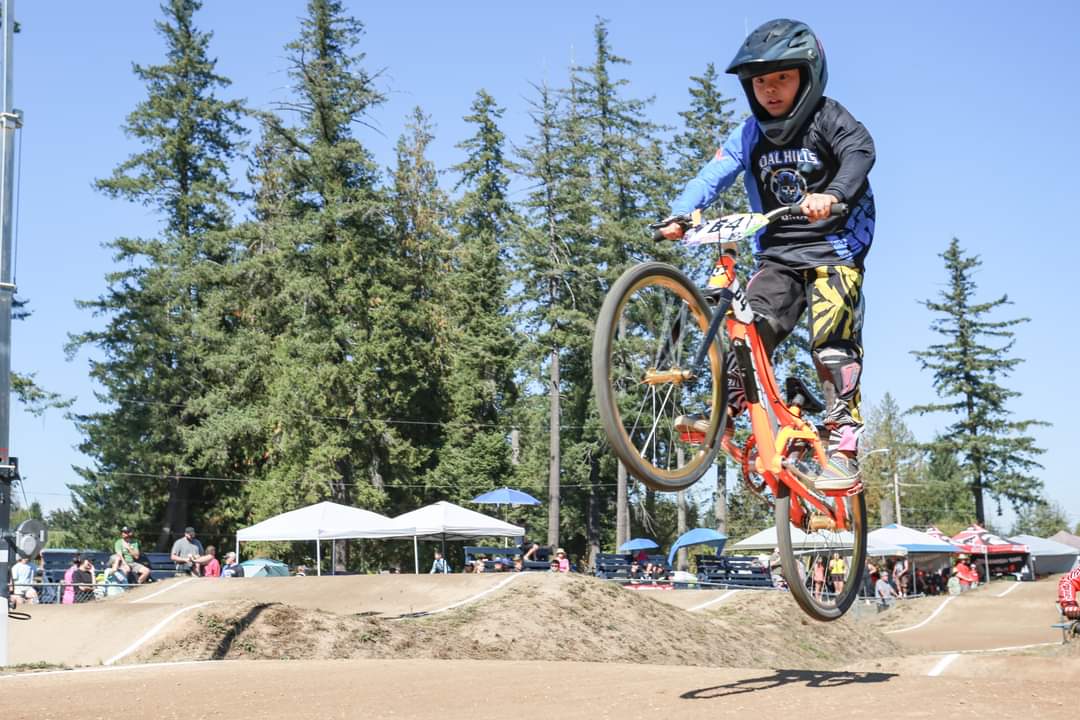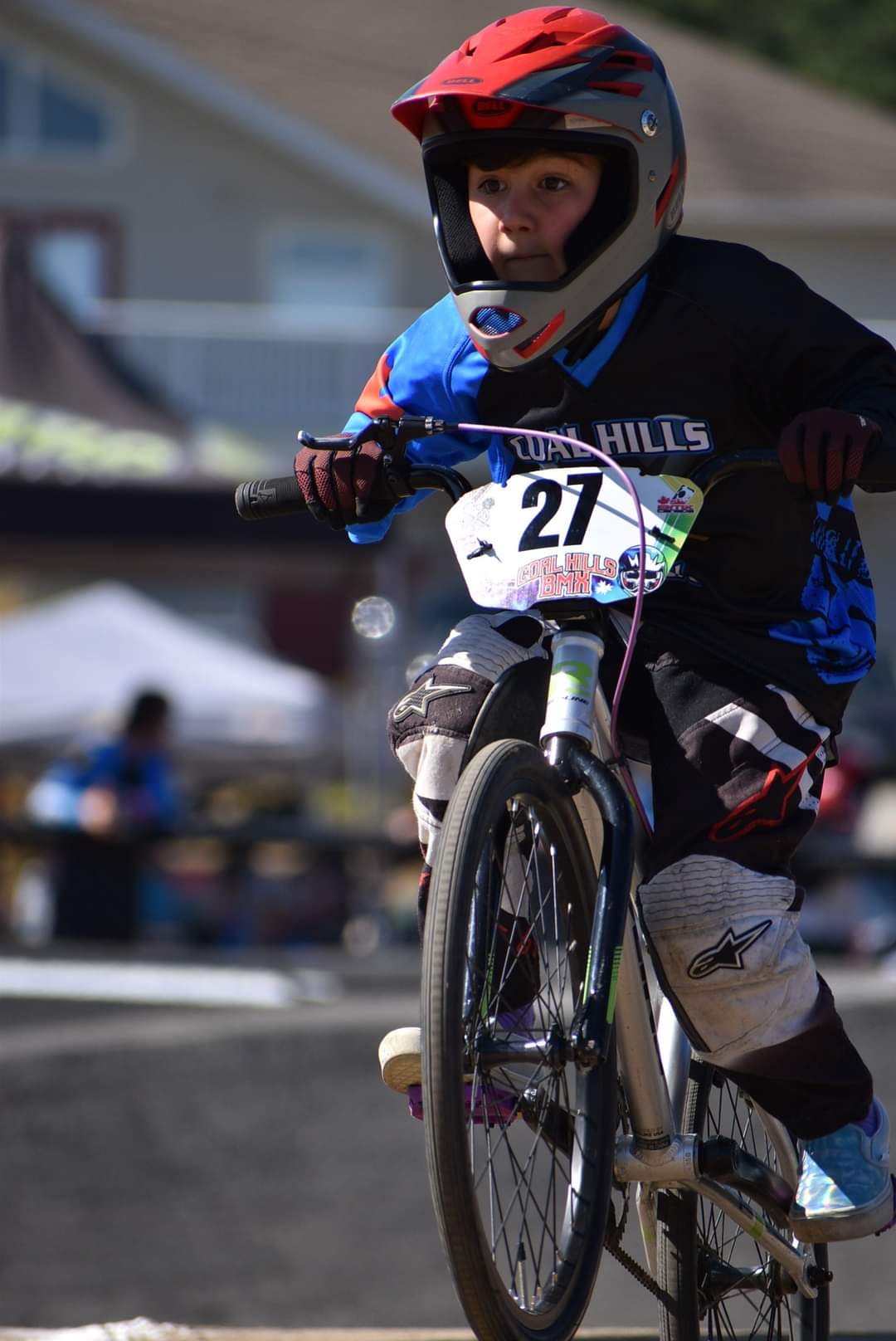
For BMX enthusiasts Ava (8) and Gavriel (9), life’s pathways have not been smooth – both literally and figuratively. Yet despite the bumps and uphill climbs, these challenges haven’t stopped them in their tracks or slowed their momentum.
The Métis-Cree siblings found their forever family with adoptive parents Meika and Krista as infants, and would learn from their moms how the power of sport could be harnessed to transform life’s challenges into triumphs.
Gavriel lives with autism and Ava lives with neuro-complexities. As a baby, Ava didn’t follow the usual trajectory of physical development. She didn’t learn to roll nor accomplish other early milestones such as sitting up and crawling because her muscle tone and core strength were undeveloped.
Initially, specialists worried that she would not be able to walk properly or ride a bicycle. Ava’s moms, both avid sports enthusiasts, brought their knowledge of bodies and balance to their daughter’s life.
“We did a lot of work, such as home physio,” Meika recounted. “We walked with her barefoot on the rocks at the beach and found that Ava enjoyed swimming. These activities and others were incredibly helpful to improve her brain connectivity, physical strength, co-ordination and mobility.”
Ava’s hard work and dedication paid off. By the time she was five years old, she could walk, run, use stairs and even ride a two-wheeled bike independently. However, BMX racing for Ava at this point seemed unrealistic.
The love of BMX biking runs deep in the family. Meika is an avid rider herself, preferring a bike over a car as her mode of transportation, yet it was older-brother Gavriel who first sparked Ava’s interest in the sport. Wanting to follow in her big brother’s footsteps, Ava pursued the sport with fierce determination, joining her other brother, Kylan and sister, Tatum on the BMX racetrack.

Gavriel’s sport journey is just as amazing.
“Gavriel’s interest in BMX racing began after he saw a picture of a family friend holding a trophy and he asked me how he could get one for himself,” Meika recalled. “When I told him that it was from a BMX race, he was certain he could win one and eventually he did.”
It turns out that the sport is perfect for Gavriel and benefits him in unexpected ways. Gavriel often feels anxiety in environments that are unfamiliar to him, but surprisingly this is not the case when it comes to BMX tracks.
“I asked him once why he does so well with the many different environments he encounters through racing, that would typically be terrifying to him,” Meika commented. “Gavriel responded that BMX tracks are predictable. He further explained that there’s a start gate and finish line. The rules are always the same – to get from one place to the other. And that’s all you need to do.”
Gavriel’s response gave Meika a whole new perspective on the sport. She realized how true his unique view was, and how it applied in more than one way when it came to sport.
“When it comes to BMX racing, our Coal Hills BMX club has a code of conduct that’s pretty straightforward,” stated Meika. “The expectation of being a member of your BMX club is simple. You show up, you’re a good human, and you support others in being good humans, as well as celebrate their successes, big or small. My kids have learned that you represent not just yourself, but your club as well.”
Meika also appreciates how the club provides opportunities for their family to connect with their Métis-Cree heritage. The club invites its members to engage in activities that acknowledge the important role sport has in advancing reconciliation and reinforcing a sense of identity and cultural pride for her kids.
“Our club is magical because they celebrate Orange Shirt Day as a specific ride in our calendar,” says Meika. “All the participants are asked to wear orange, and as a family, we have brought along our mini power drum and invite drummers to participate as well.”
These are just some of the many positive returns Meika’s children have experienced from being involved in BMX racing – an experience that Meika states would not have been possible without the funding provided to her through the Province’s RISE Grant Program. RISE stands for Resilient, Inspire, Strength, and Engage, which are exactly the objectives this program aims to accomplish and impart to its recipients.
The RISE Grant Program supports youth during and from government care to pursue sport, recreation, physical and cultural activities. It is administered through the Province of British Columbia in partnership with the Indigenous Sport, Physical Activity & Recreation Council (I·SPARC). The program is in alignment with the Declaration Act and Declaration Act Action Plan item 4.06, which the BC government commits to “promote culturally relevant sport, physical activity and recreation initiatives and opportunities that increase Indigenous engagement, participation and excellence in both traditional and mainstream sports for individuals in both urban and rural or remote areas.”
Additionally, The RISE grant program responds to the Truth and Reconciliation Commission of Canada Calls to Action #89 and #90, which call on governments “to reduce barriers of participation and provide stable funding for Aboriginal communities”.
Through the program, applicants can receive grants of up to $1,000 annually to help cover program fees, equipment costs and travel expenses. To date, 971 individual grants have been given since the program began in 2022.
“The RISE grants have been essential. With the funding, I’m able to buy the best equipment for them to be safe,” said Meika. “Because of their neurodiverse condition, it’s critical for both Ava and Gavriel to have a helmet that is of a higher standard than the one they were wearing before. There’s no way we could have afforded this type of equipment on our own.”
As well as its focus on advancing reconciliation in British Columbia, the RISE program is aimed at using the power of sport to enhance mental and physical well-being, and build confidence, strengthen physical skills and foster community connections.
Meika attests to sport’s positive impacts in the lives of her children. “Kids all have skills and attributes that need an outlet. This is what fosters a healthy mind, body and soul, and fuels a sense of worth that can energize positive change,” Meika commented. “Sports, along with other culture-based activities, like being involved in dancing and drum circles, learning language, and engaging in land-based skills, activates connectivity in Indigenous communities and keeps our kids moving in the right direction.”
Ava and Gavriel continue to enjoy the sport of BMX riding. When asked what they like about BMX biking, Gavriel lists three important reasons: “BMX is a challenge, and I make new friends and can help people.”
Ava also aptly sums it up by stating: “I love BMX racing because it’s fun to ride the track!”
Recently, they have each reached significant milestones: Ava won her first race, and Gavriel stretched himself to go beyond predictability. Although he is not fond of chairlifts, as he avoids uneven surfaces above the ground, Gavriel’s new interest in mountain biking has caused him to push past this hurdle. He’s now biked on Mount Washington, coming down the mountain twice in one day.
As a witness to the power of sport in her children’s life, Meika knows there is more to come. She concludes with this final thought: “Sport, it’s an equalizer. Being part of a team gives kids a sense of belonging and identity. Sport also provides a pathway to discovering our skills and experiencing the thrill of going beyond our own expectations. As a mom, it’s great to have your kids learn to be proud of skillsets they have worked hard to acquire and have them be inspired to push further to reach that goal or build that next skill level.”
To learn more about the RISE program, visit RISE Grants for Individuals on the I•SPARC website.
